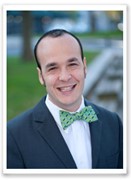By Lee Chottiner
Community Editor
For Ben Freed, journalism and the rabbinate are two similar jobs.
He should know; he’s done both.
Freed, 32, spent four years as a general assignment reporter at the Ann Arbor News in Michigan. He also interned at Sports Illustrated in New York in 2011.
“When people ask me why I loved being a journalist, I tell them I love asking questions, telling stories and helping people understand the world around them,” Freed said.
So when he started thinking about his next move in life, the son of a Federation executive and a physician decided that being a rabbi would represent an extension of what he was already doing.
“The leap from journalist to rabbi didn’t feel that different when I defined it that way,” he said. “It was a slightly different and really exciting and inspiring way to go about doing a lot of those same things that I had been doing as a journalist.”
That was six years ago. Today, Freed, who is about to be ordained by the Jewish Theological Seminary of America, has been hired as the next rabbi of Keneseth Israel Congregation. He starts his new career on July 1.
The tools Freed honed as a reporter will serve him well at his new pulpit.
“Being a journalist taught me to listen, which is an incredibly important role of a rabbi,” he said. “I think the first thing that we do as rabbis is listen and ask questions.”
Also, telling stories – through a eulogy, a D’var Torah or some other genre – is a cornerstone of a rabbi’s work.
“There is so much that is storytelling,” Freed said.
KI Executive Director Yonatan Yussman said Freed is prepared to be a pulpit rabbi from day one, even though he is just now being ordained.
“A lot of times, rabbis right out of rabbinical school need some time to become an experienced rabbi,” Yussman said, “but even from his references everyone said Rabbi Freed is ready on day one to go straight from the gates, which is extremely rare.”
Yussman added that Freed’s fiancée, Ariane Barrie-Stern, a drama graduate from The New School in New York, will become KI’s first artist in residence.
“We’re creating that [position] right now,” Yussman said. “She will be working at KI and in the community in terms of teaching those arts and hopefully putting on a theater production at Keneseth Israel.”
Freed said he and Barrie-Stern are excited to work with Yussman and Cantor Sharon Hordes.
A fourth-generation Texan, Freed gets his love of Judaism straight from his parents. His earliest memories are of Shabbat dinners, usually with guests, singing, laughing and sharing stories.
His mother, Eileen Freed, executive director of the Jewish Federation of Greater Ann Arbor, and his father, Dr. Gary Freed, a professor of pediatrics (primarily health policy and services research) at the University of Michigan, also founded a day school when the family lived in Chapel Hill, North Carolina.
But it was when the Freeds moved to Australia for three years, leaving their son, already on the staff of The News, and a roommate – another young Jewish journalist – to live in their house, that Freed’s love for Judaism evolved.
The roommates turned the dwelling into a “Moishe House” of sorts, holding Shabbat dinners and building sukkahs for Ann Arbor’s young Jewish adults.
One night, while the two were cleaning up after a Shabbat dinner, Freed’s friend reflected on how he grew up without much Jewish culture at home, though he did have a bar mitzvah.
Since moving in with Freed, he continued, he now wanted this type of life for himself and wanted to help others experience it.
Freed described that talk as a “light bulb event.” Thereafter, he thought seriously about becoming a rabbi.
Freed is aware that he starts his career at a time when organized religion is declining, and many Jews are finding their spiritual needs fulfilled in other ways (“on a yoga mat…in an ashram… on a mountain”).
Yet he is convinced that Judaism remains equipped to give young and old Jews what they need to live full lives.
“We have this amazing Jewish spirituality that Jews can plug into, and that’s exciting,” he said. “I want people to be able to plug into their traditions – their ancestors’ technology –for what it means to be spiritual.”
But Judaism is not just what happens within the four walls of the synagogue, Freed added. He looks forward to meeting with his colleagues and learning how they can collaborate.
In fact, he said the top item on his “checklist” so far is to get to know the entire community.
It’s not like the soon-to-be cleric doesn’t know what to expect from the rabbinate. He’s already held several rabbinic internships during his years at JTS, in Jerusalem, on college campuses, in Riverdale, New York and Little Rock, Arkansas – that last stint a solo pulpit.
Freed described his time as student rabbi as being “a rabbi with training wheels.” He always had his mentors to fall back on and to bounce ideas off.
“Now,” he said, “I’m ready for the training wheels to come off.”



